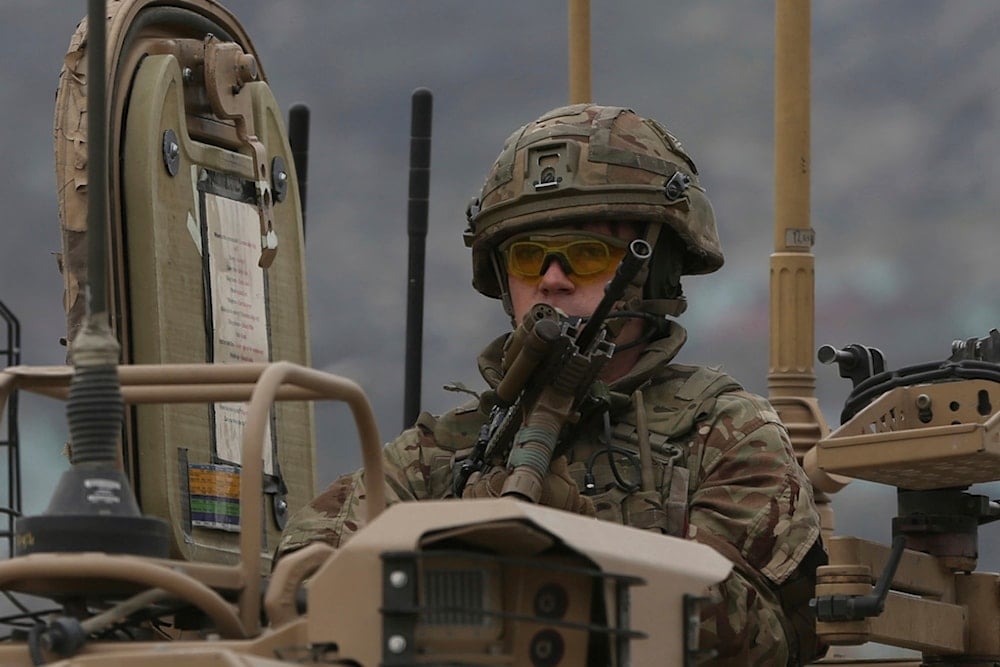SAS vetting power exposed as Afghans denied UK asylum en masse
A UK special forces officer has rejected over 1,500 Afghan resettlement applications, raising concerns of a conflict of interest amid a war crimes inquiry involving the SAS.
-

A British soldier with NATO-led Resolute Support Mission forces arrives at the site of an attack in Kabul, Afghanistan, Wednesday, March 25, 2020 (AP)
A British special forces officer rejected more than 1,500 resettlement applications from Afghans with verified ties to the UK, newly released Ministry of Defence (MoD) documents have revealed, as reported by The Times.
The officer may be linked to the ongoing public inquiry into alleged war crimes committed by the Special Air Service (SAS) in Afghanistan.
The disclosure has triggered serious concerns about a potential conflict of interest, as many of the rejected applicants, elite Afghan soldiers known as the Triples, could have witnessed or possessed evidence related to those war crimes.
Read more: Kabul evacuation whistleblower wins case against UK government
Over 1,500 Afghan ARAP applications rejected by UK special forces officer
The documents, submitted to the court, show that during a 2023 “backlog sprint” effort, one unnamed officer turned down 1,585 Afghan Relocations and Assistance Policy (ARAP) applications. These rejections raise questions about the integrity of the resettlement process for Afghans who had served alongside British forces.
In a statement, Natalie Moore, head of the Afghan resettlement team, acknowledged that while special forces did not formally possess veto power, their decisions effectively determined outcomes.
“The secretary of state recognises that in many instances the decision on whether to grant an Arap [Afghan Relocations and Assistance Policy] application was, in practical terms, taken by [special forces] and the Darr [Defence Afghan Relocation and Resettlement] caseworkers simply implemented the … decision,” she said.
Potential witnesses to SAS crimes denied sanctuary
The Triples, Afghan special forces units funded, trained, and operated by the UK, were often present during British operations in Afghanistan. Their potential testimony is of interest to the public inquiry currently examining alleged extrajudicial killings and other violations by SAS units.
The BBC recently reported that the officer who processed the applications served in Afghanistan and rejected claims from individuals who may have witnessed these alleged crimes. The MoD now faces accusations of using resettlement rejections to prevent key witnesses from entering the UK.
Read more: UK special forces soldiers accused of executing Afghan boys under 16
Former Veterans Minister accuses MoD of negligence, deception
Former Veterans Minister Johnny Mercer expressed outrage over the revelations, stating that senior special forces officials either lied or were unaware of the officer’s role.
He told The Times that the situation “increasingly appears to me like criminal negligence,” warning that some of the rejected Afghan allies have already been killed by the Taliban. “That they are Afghan lives may not matter to [special forces]. I can assure you they matter to me and I will not let this go,” Mercer said.
MoD admits role of special forces in application decisions
Moore’s statement included an apology on behalf of the secretary of state, clarifying that earlier legal filings had not accurately reflected the role of special forces. She also raised concerns about what appeared to be an unofficial practice of “automatic rejections” of Triples’ applications, suggesting the existence of a covert policy to deny sanctuary.
As the war crimes inquiry unfolds, the control exercised by special forces over resettlement applications has drawn sharp criticism. Mercer noted that the arrangement granted special forces “decision-making power over … potential witnesses to the inquiry,” describing it as “deeply inappropriate”.
A previous MoD claim that UK special forces did not influence ARAP decisions has now been publicly contradicted by internal documentation.
Review launched into improperly denied Afghan cases
The UK government has launched a new phase of the review process, with Armed Forces Minister Luke Pollard announcing it will cover up to 2,500 previously rejected cases. Many of these, including applications from Triples soldiers, are expected to be reconsidered.
Although the ARAP scheme has facilitated the relocation of approximately 30,000 Afghans, some applicants with strong links to the UK have been denied sanctuary, while others with little to no connection have been accepted.
One such case involved an MI6 Afghan informant who was abandoned after assisting British intelligence in operations against the Taliban.
Read more: Ex-UK soldiers implicate colleagues in war crimes in Iraq, Afghanistan

 4 Min Read
4 Min Read








